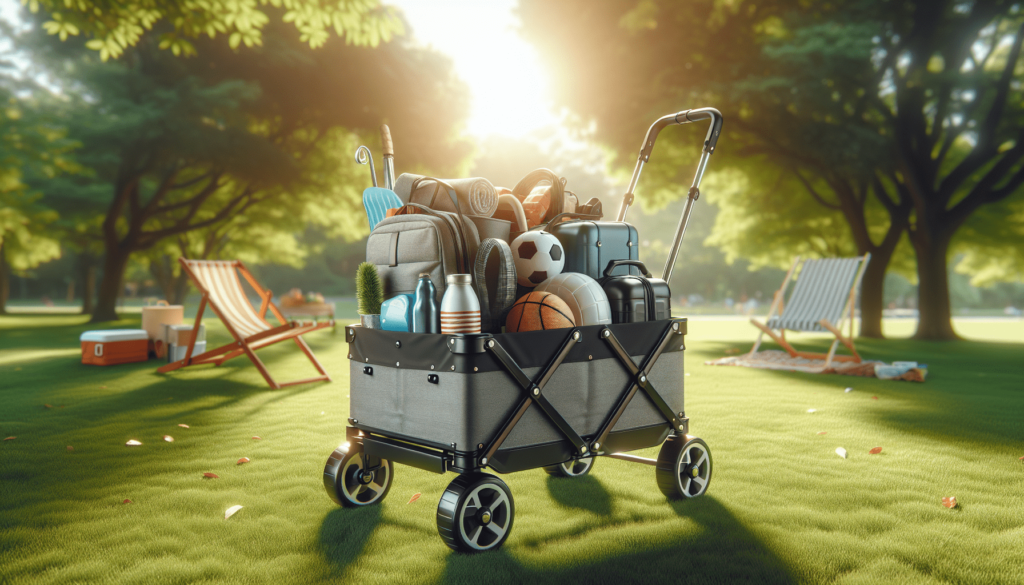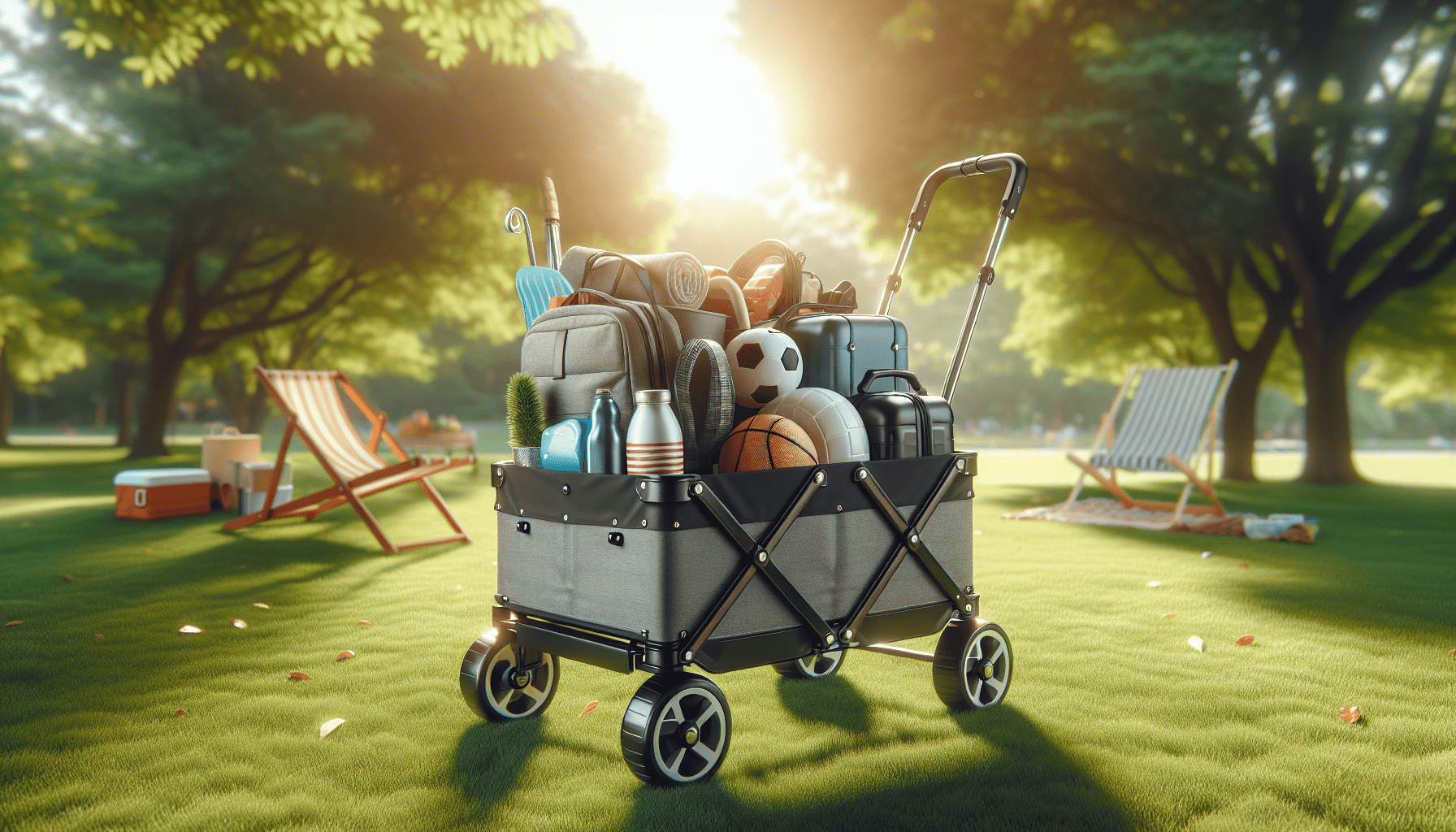What do you think about the amount of weight your folding wagon can carry? It’s an important consideration, as understanding the weight capacity can make your outdoor adventures much smoother. You don’t want to find yourself in a situation where you’ve overloaded your wagon and risk damaging it, or worse, compromising your safety.

Why Weight Capacity Matters
Weight capacity is not just a number; it’s an essential specification that determines how much load your wagon can bear. Overloading your folding wagon not only risks damaging the cart itself but can also lead to potential accidents. The last thing anyone wants while carrying gear to a picnic, beach, or camping site is to have their wagon fail mid-journey.
Safety First
When it comes to using a wagon, safety is paramount. The last thing you want is for your wagon to tip over or break while you’re on an uneven trail or trying to navigate a crowded space. That’s why knowing the weight capacity helps you pack smarter. You can ensure that you’re not exceeding the weight limit and risking an unfortunate situation.
Understanding Weight Limits
Each folding wagon has a designated weight limit that is usually specified by the manufacturer. This weight limit includes everything you plan to carry—gear, groceries, tools, and any other items. It’s crucial to account for the total combined weight of all these items rather than assuming you can merely pile things into your wagon without a care.
The Basics of Weight Capacity
What Is Weight Capacity?
In simple terms, weight capacity is the maximum load a folding wagon can carry without compromising its structure or safety. This capacity can vary widely depending on the design, materials used, and the intended use of the wagon.
How Is Weight Capacity Determined?
Manufacturers often conduct thorough testing to determine the weight capacity of their wagons. They consider factors such as material strength, wheel design, frame stability, and overall construction quality. In essence, anything that leads to a reduction in structural integrity or performance when loaded is factored into the weight capacity.
Common Weight Capacities
Most folding wagons come with a weight capacity that ranges from about 75 pounds to over 300 pounds. Let’s break down these common weight capacities:
| Weight Capacity Range | Usage Example |
|---|---|
| 75 – 100 pounds | Light-duty use such as simple garden tasks |
| 100 – 150 pounds | Moderate load for outings like picnics or short hikes |
| 150 – 250 pounds | Suitable for transporting sports equipment and camping gear |
| 250 – 300+ pounds | Heavy-duty use for large camping trips or extensive gear transport |

Factors Influencing Weight Capacity
Several factors play a role in determining how much weight your folding wagon can handle. Understanding these factors will help you make a more informed decision when choosing or using your wagon.
Materials Used
The materials that make up your wagon—such as steel, aluminum, or plastic—will influence its weight capacity. Metal frames typically offer more support than plastic constructs, making them well-suited for heavier loads. This durability often comes at the cost of increased weight, so you’ll want to find a balance that works for your needs.
Wheel Design
The design of the wheels also contributes significantly to the weight capacity of the wagon. Larger wheels, for instance, often perform better on uneven terrain and distribute weight more effectively. They reduce the workload on the wagon’s frame, allowing it to carry more without suffering from damage or instability.
Frame Stability
A folding wagon with a more rigid, stable frame can generally handle a higher weight capacity compared to a more flexible or flimsy design. Frame stability is crucial, especially when navigating rough or uneven terrain where the load can shift suddenly.
Intended Use
The purpose for which you intend to use the wagon also plays a part. If you’ll be using it primarily for lightweight tasks, a lower capacity wagon may suffice. Conversely, if you plan on taking your wagon to the beach, the park, or on camping trips, opting for a higher weight capacity is essential.
How to Calculate Your Load
Take Inventory
Before you load up your wagon, it’s essential to take stock of everything you plan to carry. Make a list of items and their respective weights to ensure you’re within the limits. Common items you might include could be:
- Camping gear (tent, sleeping bag)
- Picnic supplies (cooler, food baskets)
- Beach equipment (chairs, umbrellas, towels)
- Sports equipment (balls, nets, pads)
Weigh Your Items
If you’re not sure about the weights of your items, use a kitchen scale, or if you have larger items, consider going to a local gym or facility that has a larger scale. This helps you quantify what you’re putting in the wagon, making it easier to stay within your weight limits.
Factor in the Wagon Weight
Don’t forget that your folding wagon has its own weight. Ensure you account for this when calculating the total load you’re planning to carry. For instance, if the wagon weighs 20 pounds and you plan to carry 80 pounds of items, your total load is 100 pounds. Be sure this total falls below the wagon’s weight capacity.
Common Mistakes to Avoid
Ignoring Manufacturer Guidelines
A common error many make is to ignore the manufacturer’s guidelines regarding weight capacity. Each wagon has been meticulously tested to provide a maximum load figure; dismissing this figure can lead to damage and safety hazards.
Underestimating Item Weights
Another mistake is underestimating the weight of individual items. A cooler full of drinks might seem manageable, but when packed, it can weigh quite a bit. Always be realistic about the weights of the items you intend to carry.
Not Distributing Weight Properly
How you load your wagon matters. Placing too much weight on one side can lead to tipping and instability. Aim for an even distribution of weight to enhance stability, especially when traveling over bumpy terrain.
Forgetting to Check for Wear and Tear
Before heading out, it’s crucial to inspect your folding wagon for any signs of wear and tear. Ensure that all components are functioning well, as damage or deterioration can lower the effective weight capacity and could lead to unfortunate mishaps.
Benefits of Knowing Your Wagon’s Weight Capacity
Enhanced Safety
Knowing the weight capacity helps you pack wisely, which enhances safety. You can enjoy your outing without worrying that your gear will malfunction or that you’ll experience a sudden shift that could cause an accident.
Better Planning and Organization
With a clear understanding of your wagon’s limitation, you are better equipped to plan your outings. This could mean packing fewer items or selecting lighter alternatives, ultimately leading to a more enjoyable experience.
Improved Wagon Longevity
By adhering to the weight capacity and not overloading your folding wagon, you ensure that it will last longer, perform better, and save you money in the long run. Investing in a quality wagon that suits your intended load can make a significant difference in your experiences.
How to Choose the Right Folding Wagon
Assess Your Needs
Before making a purchase or deciding to use your wagon, take a moment to assess your needs. Consider how frequently you’ll use it and for what purposes. This will guide you toward the right size and weight capacity.
Read Reviews and Specifications
Take the time to read product reviews and the specifications provided by manufacturers.
Test Drive
If possible, visit a store where you can test the wagon first. Pushing it around with weights (or simulating a load) can give you a better sense of its performance.
Look for Features That Matter
Consider features such as:
- Wheel size and design
- Ease of folding and unfolding
- Storage options
- Durability of materials
These aspects impact not just the capacity but also the overall usability of your wagon.
Conclusion
Being aware of your folding wagon’s weight capacity is essential for safe and enjoyable outdoor experiences. By understanding the factors that influence weight limits, calculating your loads carefully, and choosing the right wagon, you not only ensure your safety but also enhance your overall adventure experience.
So next time you’re gearing up for a picnic, a camping trip, or a trip to the farmer’s market, take a moment to consider your wagon’s capabilities. It can truly make all the difference in your enjoyment and safety. Remember, a well-planned load ensures that every outing is as fun as it should be!

